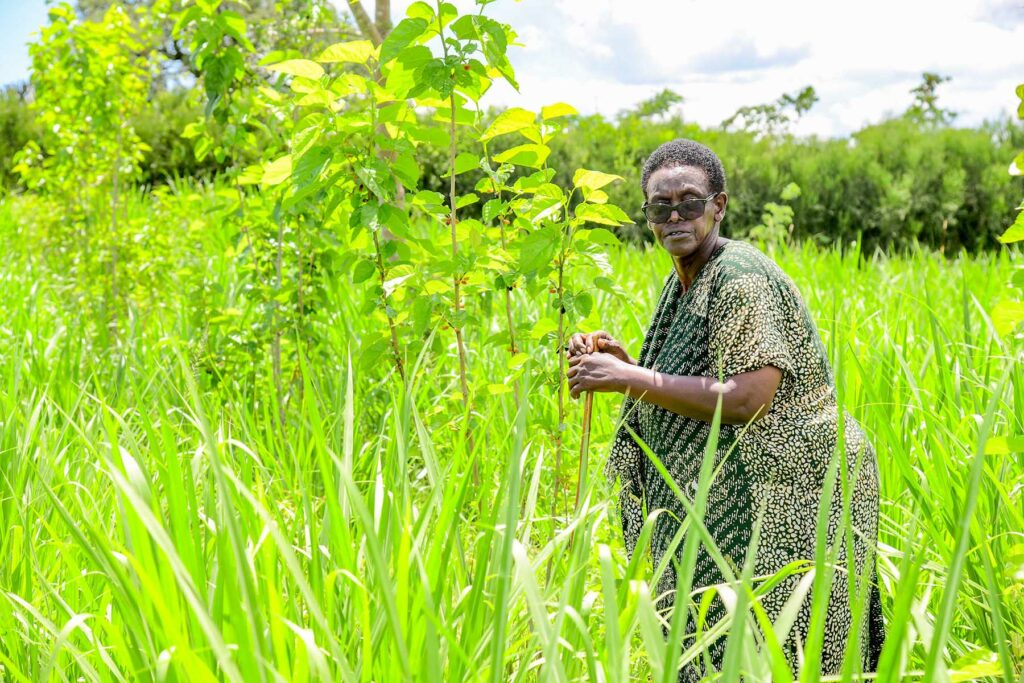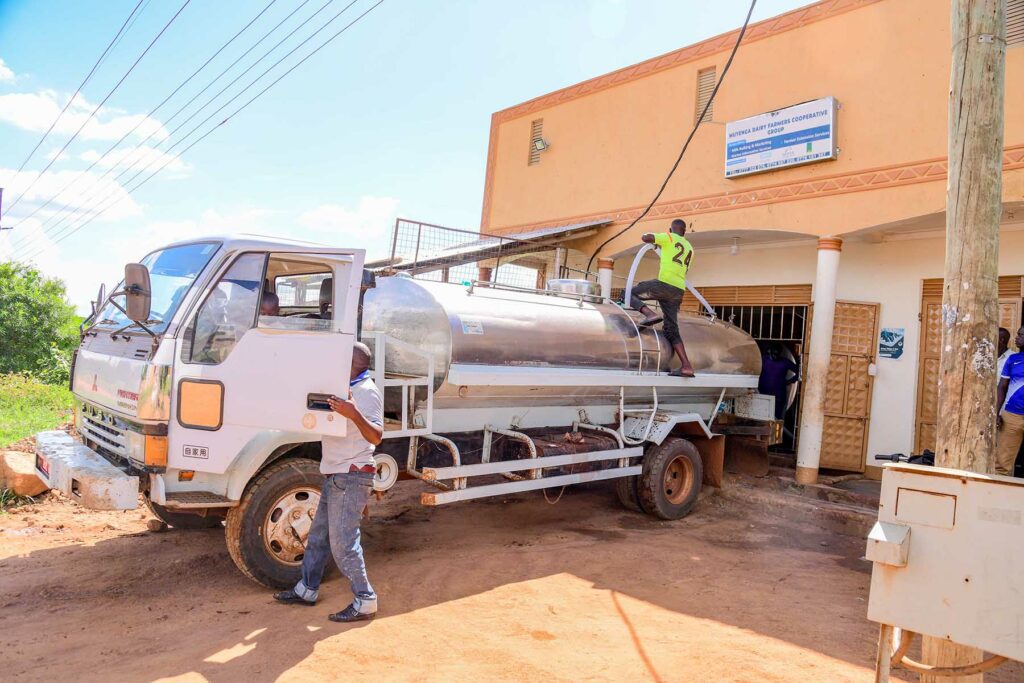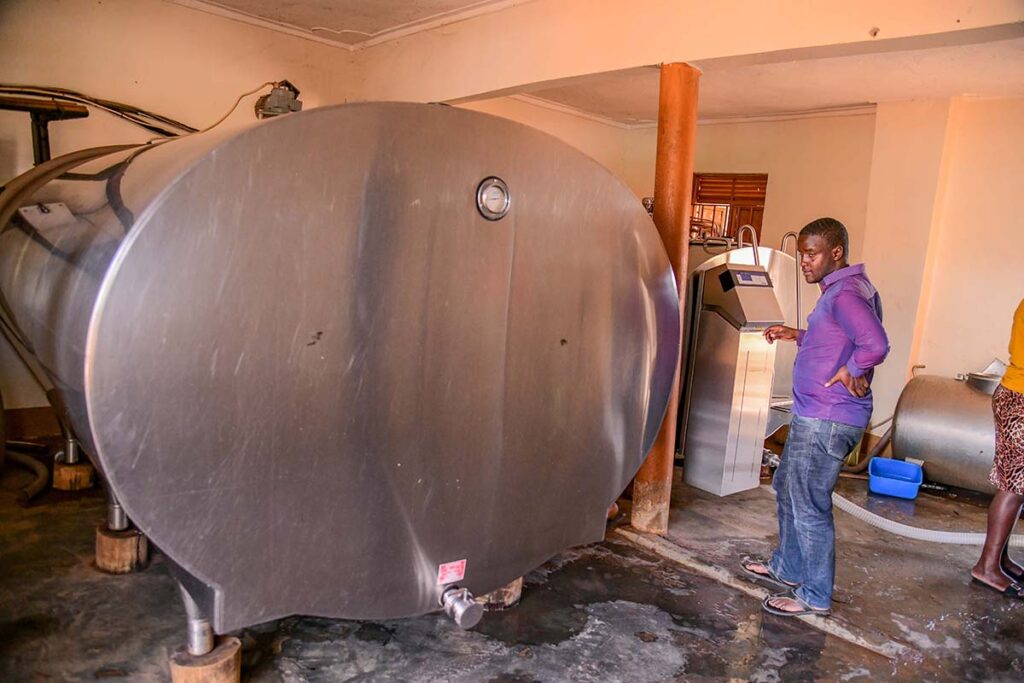By HERBERT MUSOKE
aBi-development has supported many farmers countrywide achieve better yields and earnings. aBi’s focus is to increase agricultural production and value addition by extending matching grants and business development services to agribusinesses, farmer organisations and intermediaries to enhance planning and management. They also support production and business infrastructure, as well as upstream and downstream market linkages of producers and agribusinesses. In a night-part series, Harvest Money shall carry stories focusing on the success of aBi activities countrywide. In the sixth of the series, Herbert Musoke casts the spotlight on aBi’s interventions in the DAIRY value chain in Kyankwanzi
In 2010, Jane Mirembe ventured into livestock farming with 15 local cows. These used to yield 3-5 litres of milk a day. The cattle numbers kept increasing by the year, but the milk production remained low until in she attended training.
Mirembe is a dairy farmer in Mpenkoni village, Kyankwanzi district and is one of the 48 members of Muyenga Dairy Farmers Cooperative Society Ltd at Kyankwanzi, who have been transformed by the training and other activities conducted by Heifer International and JESA Farm Dairy Ltd.
Heifer International and JESA Farm Dairy Ltd are the implementing partners for the aBi Green Challenge Fund where aBi channels grant and all the necessary help to the last beneficiary.
The organisations, Mirembe explains, trained her and other farmers on the best practices in dairy farming, which has significantly transformed the way they keep cows.
“Before the training, I did not know what to do, but afterwards, I felt I had finally received the answers I had been looking for. We were taught how to focus on the quality of the cows as opposed to quantity. We also learnt that even on small land, you can keep animals that will yield highly by growing pastures,” she says.
Trainers from JESA Farm Dairy Ltd taught the farmers the best agronomic practices like pasture growing and the best varieties. The officials from JESA Farm Dairy Ltd also supervised the farmers to ensure they were implementing whatever they had learned.
“We then set up a farmer cooperative (Muyenga Dairy Farmers Cooperative Society Ltd) through which we mobilised funds and have been connected to financing organizations like EMATA Uganda Ltd and guaranteed us to get milk coolers and loans,” she says.

Increasing milk
Last November, she sold 54 of her 74 cows and she says the productivity of the remaining cattle has improved tremendously.
“I have kept applying the lessons learnt during the training and I am willing to further reduce my herd to 10 cows if that’ what it will take to get high yields as opposed to having many cows that do not produce much. For example, from the 70, I used to get about 40 litres and still harvest the same from 20 cows. That is why I plan to sell other cows and get improved and productive breeds,” she says.
Heifer International Uganda also gave her a forage chopping machine at subsidised cost last year that eased the work other than using a pang they used to cut the pasture that would take them a whole day.
“Because we were affected by drought, Heifer International Uganda trained us in preserving pastures in hay and silage which we can feed our cows on during the dry period. Right now, I have preserved pastures in Hay and Silage awaiting that period,” she says.
Plans
Heifer International Uganda and JESA Farm Dairy Ltd have done a commendable job especially us who have small land because we can now get something from our farms.
“I want to improve my breed, but still I will keep it limited because I don’t want to overstock and reach a point when I am not able to feed them, until when I buy more land,” she says.
She says that they still want more assistance, especially with tractors since they have a challenge of workers which has limited her the size of her pasture to only five as she doesn’t have workers to open the land, weed and harvest.
Challenges
Her biggest challenge she says is a limited labour force.
“If I had more workers, I would be having about half of my land planted with pastures.”
The other challenge, Mirembe says, is wild animals especially the monkeys and antelopes which eat whatever it is that we plant and even others eat grass like cows and goats.

Muyenga Dairy Farmers Cooperative Society Ltd
After Heifer International Uganda and JESA Farm Dairy Ltd trained the farmers on the best agronomic practices, the farmers formed a cooperative through which they would continue training themselves and come up with development plans and programmes, says Obed Manoni, the secretary of the group.
“The cooperative was formed in 2020 and has 48 members. The cooperative has been instrumental in capacity building, farm quality assessment, acquisition of equipment like coolers and other machines like forage choppers,” he explains.
He adds that, through the cooperative, Heifer International Uganda and JESA Farm Dairy Ltd have connected them to financial institutions like EMATA Uganda Ltd that have granted them soft loans at an interest rate of 3% per month.
Marketing
Partnering with Heifer International Uganda gave the cooperative the confidence to work together and also connect them with JESA Farm Dairy Ltd which has given them a good price for their milk, explains Gideon Nshajja the cooperative treasurer.
“Because we are working as a group, it has given confidence to big buyers like JESA Farm Dairy Ltd to work with us since we can supply them with high quantity and quality milk consistently.
The work relationship has increased the prices to over sh1,500 compared to the sh200 that we used to sell our milk before the cooperative was formed,” he explains.
Benefits to farmers
Nshajja explains that the cooperative now has two coolers, one with 3,200 litre capacity and recently acquired one of 9,200 litre capacity coolers. They plan to get a third cooler after completing the loan for the second cooler.
“We are getting more milk than we can store because members have increased productivity on their farms, but also other farmers want to store their milk with us and benefit from the market we have. We also need a bigger truck because the one we have now can carry 7,400 litres, yet we get more than that on a dairy,” he says.
Also, the organization has dug dam at three of the members’ farm as a demonstration to other farmers for water storage that can be used during the drought.
In addition, farmers were given forage choppers that they use to chop pastures for their cows which reduces work load but also ease the work of chopping pastures for their animals than before when they used to cut it using pangs.
Quality assurance
Colins Kenji, a community agrovet entrepreneur working with this cooperative, says he has helped it build capacity to get people to taste the quality of the milk brought by members before it is put in the coolers.
“Through capacity building, we have enabled the cooperative to train some members who monitor the farmers on best agronomic practices especially the medicine withdrawal period such that if there are any farmers who have treated or vaccinated their animals should ensure the recommended time is taken,” he says.
Manoni says they always talk to members about the importance of maintaining quality because if one tampers with their quality the whole batch would be affected and it would have to be poured away.
Challenges
Manoni explains that they have challenges of unpredictable price because at times JESA Farm Dairy Ltd reduces the price without notice especially in mid of the week when the cooperative has already set the prices for the members which affect the members.
“Although we get better prices, the uncertain changes in the price affect farmers. So, we always pin the prices for everyone to know how much they have since they are paid weekly,” he adds.
aBi contribution The Agriculture Business Initiative (aBi Development Ltd), was jointly founded by the Government of Denmark and Uganda in 2010. Its focus is to increase agricultural production and value addition by extending matching grant and Business Development services to agribusinesses, farmer organizations and intermediaries to enhance planning and management, production and business infrastructure, as well as upstream and downstream market linkages of producers and agribusiness. In order to achieve the following results; increase smallholder farmer’s sustainable production, productivity and marketing integration; sustainable enhanced through working with the farmers or their organizations directly or other implementing partners like Heifer and Jessa in this case.






